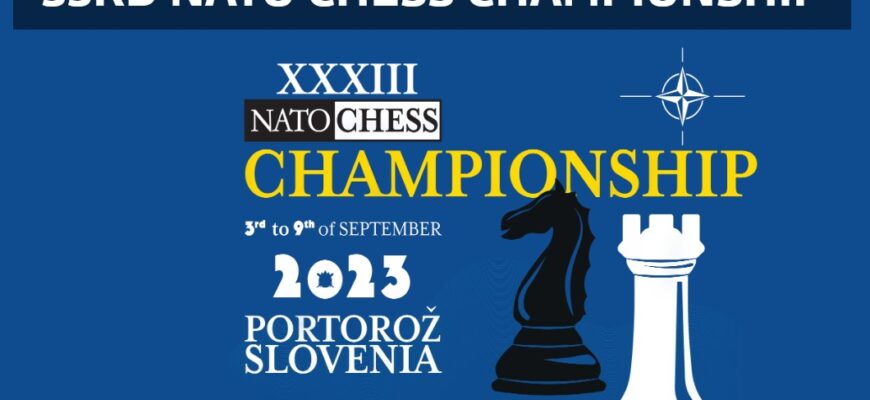In a compelling display of strategic brilliance and mental fortitude, Turkey has emerged victorious at the 35th NATO Chess Championship, held from August 18 to 22, 2025, at the esteemed Polish Air Force University in Dęblin, Poland. The tournament, a unique convergence of military minds from across the NATO alliance, showcased both individual skill and the collective spirit of international cooperation.
A Gathering of Minds in Dęblin
Dęblin, a city steeped in aviation history, provided a fitting backdrop for this intellectual contest. Over 115 players, representing various branches of NATO armed forces, descended upon the Polish Air Force University. The opening ceremony, imbued with a blend of military precision and academic tradition, saw Brigadier General Pil. Dr. Krzysztof Cur, Commander of the University, addressed with the formal academic title “His Magnificence.” A title rarely heard in the rough-and-tumble world of military sports, it provided a moment of curious gravitas, sparking quiet conversation among the participants. General Cur underscored the significance of the 2025 event, noting its alignment with the academy’s upcoming 100th anniversary of the Polish flight school.
Radosław Jedynak, President of the Polish Chess Federation, highlighted Colonel Sławomir Kędzierski`s invaluable contributions to military chess, honoring him with a gold medal. Colonel Kędzierski himself emphasized the deep-rooted connection between Poland and chess, reminding attendees of his nation`s frequent medal finishes at Chess Olympiads. “Chess,” he eloquently stated, “is one of the best sports for training the most important organ in our body – the brain.” He concluded with a powerful message, reiterating that “We are stronger and safer when we stand together,” perfectly encapsulating the dual purpose of the championship: sporting excellence and alliance unity.
Turkey`s Dominance and Germany`s Resilient Performance
From the outset, the Turkish team was considered a formidable contender, led by the highly-rated Grandmaster Batuhan Daştan, boasting a FIDE rating of 2562. Their collective strength proved overwhelming, as they secured first place in the team standings with an impressive 23 points.
Hot on their heels, Germany reaffirmed its enduring chess prowess, clinching second place with 19.5 points. This achievement was particularly noteworthy, as they navigated a fiercely competitive field that included strong teams from Poland and the USA. Germany`s consistent performance at such international events is a testament to its deep-seated chess tradition. With nearly 100 Grandmasters and over 90,000 members spread across more than 2,500 clubs, the German Chess Federation stands as one of the largest and most influential chess organizations globally.
Insights from the Board: FM Robert Stein on Mental Endurance
Among Germany`s standout players was FIDE Master (FM) Robert Stein, whose insights shed light on the demanding nature of the championship. Despite missing some top players, the German team’s ascent from third to second place in the final round was a moment of relief and affirmation for Stein. He revealed his rigorous year-round training regimen, which had recently culminated in an IM norm—just shy of a Grandmaster norm—before the NATO event, providing him with significant momentum.
Stein recounted a particularly memorable game from Round 5 against Marcin Pietruszewski of Poland. Playing Black in a Queen`s Gambit Declined, he launched a “fierce attack on the kingside,” advancing to h3 and delivering a checkmate, describing it as a “classic, sporting finish.”
When questioned about sustaining mental acuity through long games, Stein shared practical strategies: “I drink a lot, take short walks during breaks, and rely on my physical fitness – training helps me stay mentally alert during long games.” This underscores that even in an intellectual sport, physical conditioning plays a crucial role. His forward-looking perspective also offered a playful suggestion for future tournaments: an additional 10 minutes after the 40th move to enhance endgame quality, a small change with potentially significant strategic implications. Looking to the future, Stein`s determination remains steadfast: “We are already preparing to win back the gold medal next year!”
A Legacy of Unity and Strategy
The championship culminated in a closing ceremony led by Brigadier General Hendrik Steffers from the Netherlands, during which the tournament`s iconic Viking ship symbol was ceremoniously passed to Latvia, the designated host for the 2026 event. This ritual symbolizes the ongoing commitment to unity and friendly competition within NATO.
Since its inception in 1989, the NATO Chess Championship has transcended mere competition, serving as a unique platform for fostering strategic thinking, strengthening alliances, and building camaraderie among military personnel from diverse nations. This year`s event once again demonstrated that while the battles are fought on a 64-square board, the values of discipline, foresight, and collaboration resonate far beyond, echoing the very essence of the NATO alliance. Germany’s performance, particularly, showed that resilience and a strong foundation can overcome even challenging circumstances, proving they remain a formidable force in the world of military chess.








